
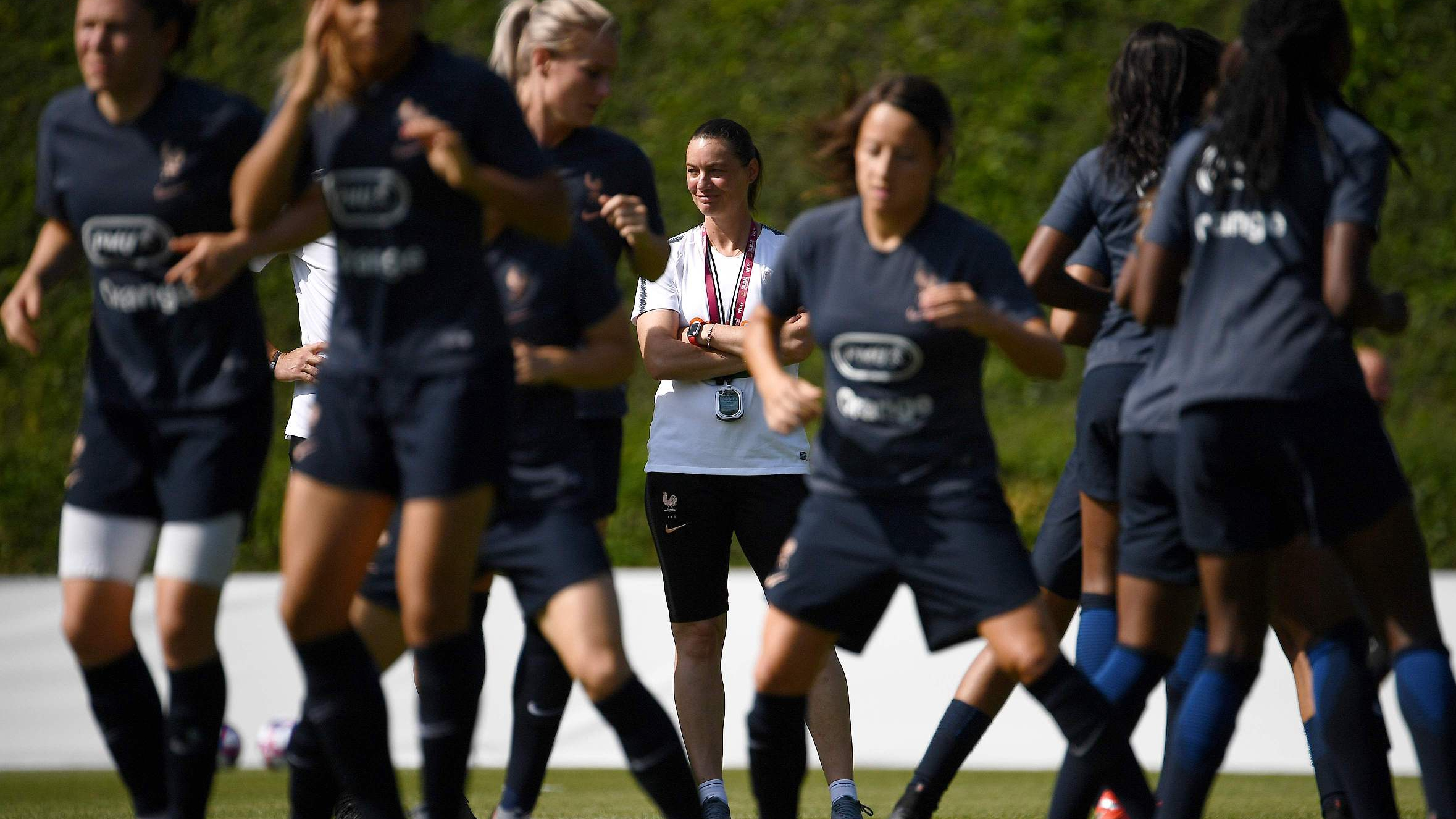
France coach Corinne Diacre looks on as her players take part in a training session in Clairefontaine-en-Yvelines, France, June 27, 2019. /VCG Photo
At the Women's World Cup in France, the players on the pitch are women, the referees officiating matches are women and the coaches sitting in the dugout are… mostly men.
While this is not unique to football, with women's teams around the world often coached by men, the opposite isn't true at men's tournaments, where players, referees and coaching staff tend to be uniformly male.
So why this gender gap? How are the female coaches at the 2019 World Cup faring in comparison to their male colleagues, and could we one day see more crossovers between men's and women's sports?
Squeezed out of the game
Ironically, the number of women coaching women's teams has actually gone down over the years.
In 1972, 90 percent of college women's teams in the U.S. had a female coach. By 2016, only about 41 percent did.
Observers have noted an increasing number of men flocking to these positions — resulting inevitably in fewer women landing these jobs.
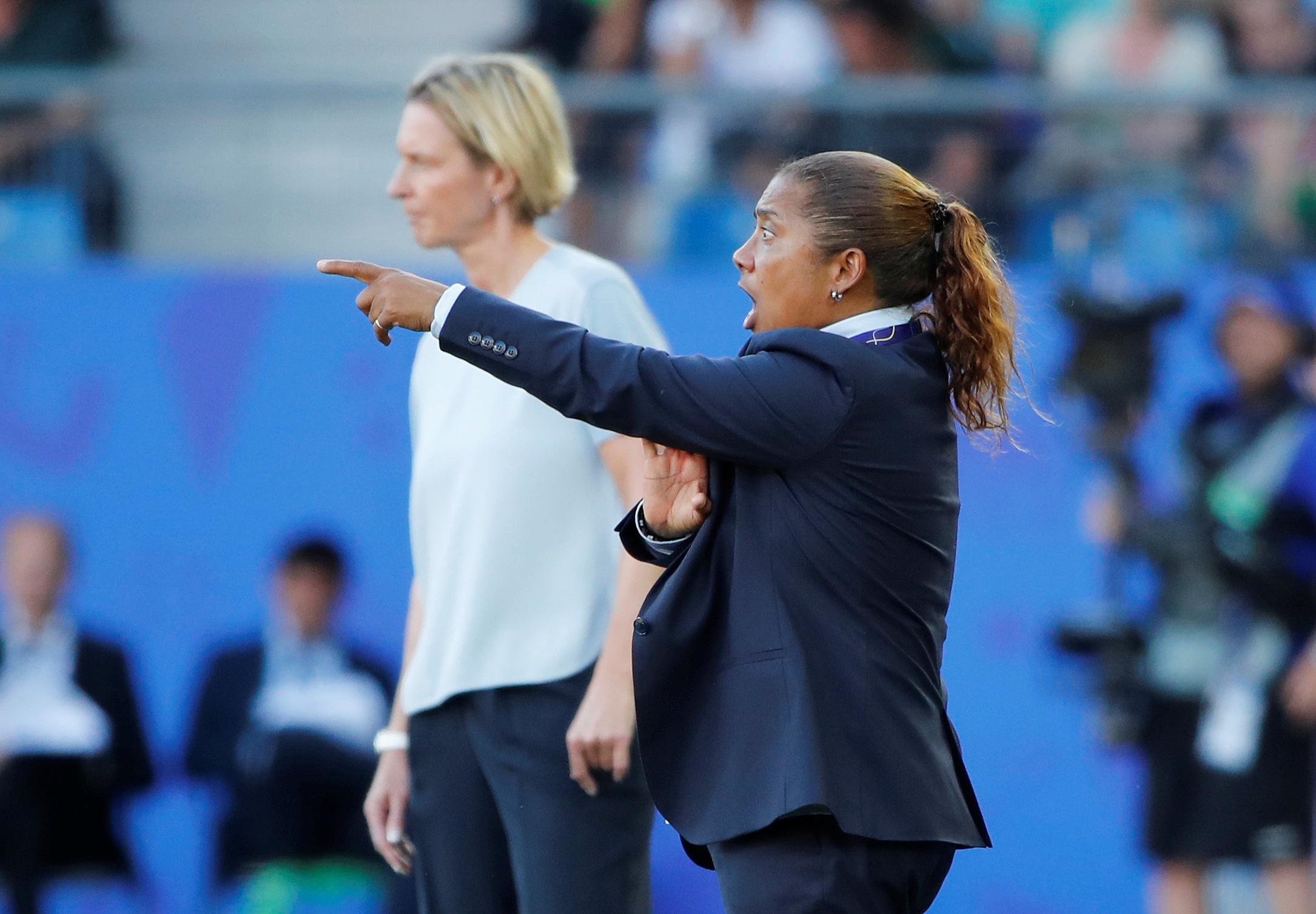
South Africa coach Desiree Ellis reacts, as Germany coach Martina Voss-Tecklenburg stands in the background, during a 2019 FIFA Women's World Cup Group B match between South Africa and Germany at Stade de La Mosson in Montpellier, France, June 17, 2019. /VCG Photo
Many blame new funding and attention given to women's sports in recent years, which — although still not matching men's sports in many cases — has made coaching positions better paid and more attractive to men who may not have been interested previously.
"Suddenly, the popularity of the game… (has meant that) more and more men have found the game interesting and want to be part of it," former England women's coach Hope Powell told a FIFA conference in 2015, deploring that female coaches were "being squeezed out of the game."
Four years on, only nine of the 24 starting teams at the 2019 Women's World Cup were coached by a woman — and even that was a record. Lyon, who just won a fourth consecutive UEFA Women's Champions League title and have been cited as a model in the development of women's football, have a male coach, as do many other top women's teams in Europe, from PSG to Barcelona and Bayern.
A winning formula
A 2014-2015 UEFA report found that only three percent of coaching licenses in Europe were held by women. Only 65 women held the top UEFA Pro license compared to 9,387 men.
And yet, female coaches have enjoyed tremendous success. Of the nine woman-led teams at this World Cup, five — including home favorites France and defending champions the U.S. — reached the quarter-finals, while Japan made it into the last 16.
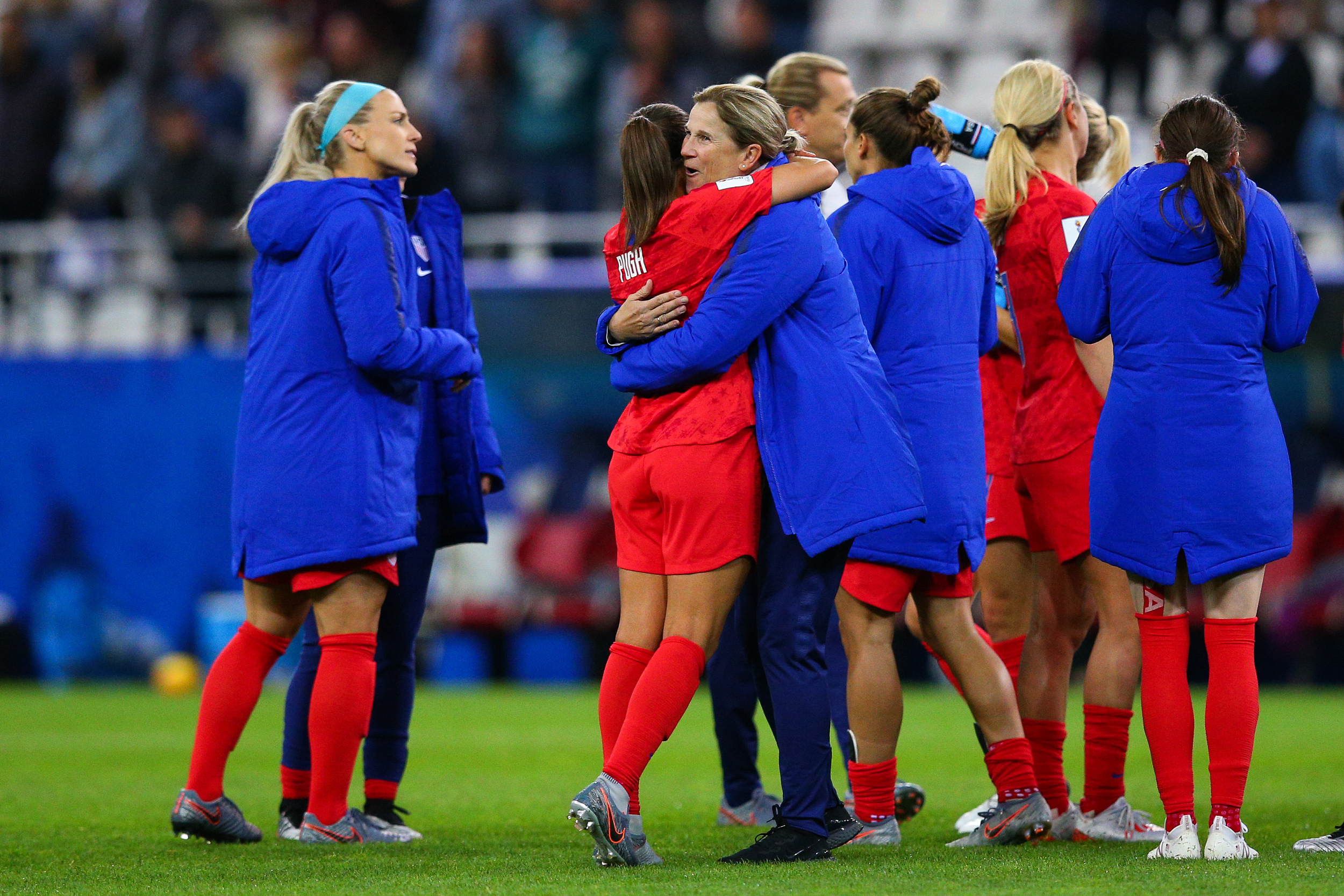
U.S. coach Jill Ellis gives player Mallory Pugh a hug after their 2019 FIFA Women's World Cup Group F match against Thailand at Stade Auguste Delaune in Reims, France, June 11, 2019. /VCG Photo
The U.S. women's team won the 2015 World Cup and were crowned Olympic champions three times under the likes of April Heinrichs, Pia Sundhage and current coach Jill Ellis.
Germany's 2016 Olympic gold and both its World Cup titles in 2003 and 2007 were under Silvia Neid and Tina Theune. Netherlands coach Sarina Wiegman led the Oranjes to victory at Euro 2017.
"In the period from 2001 to 2017, 12 of the 13 winning coaches in the major women’s national team competitions – the FIFA Women’s World Cup, UEFA Women’s EURO and the Olympic women’s football tournament – were female," according to UEFA.
Building female coaches
Football associations are now making a bigger effort to train and recruit female coaches.
UEFA launched a Coach Development Project for Women in 2016, not just to train female coaches but also "to bring about a rise in… the number of clubs and national teams that are coached by women."
A new rule was also introduced whereby all teams in UEFA women's competitions will need to have at least one woman on their coaching staff by 2020.
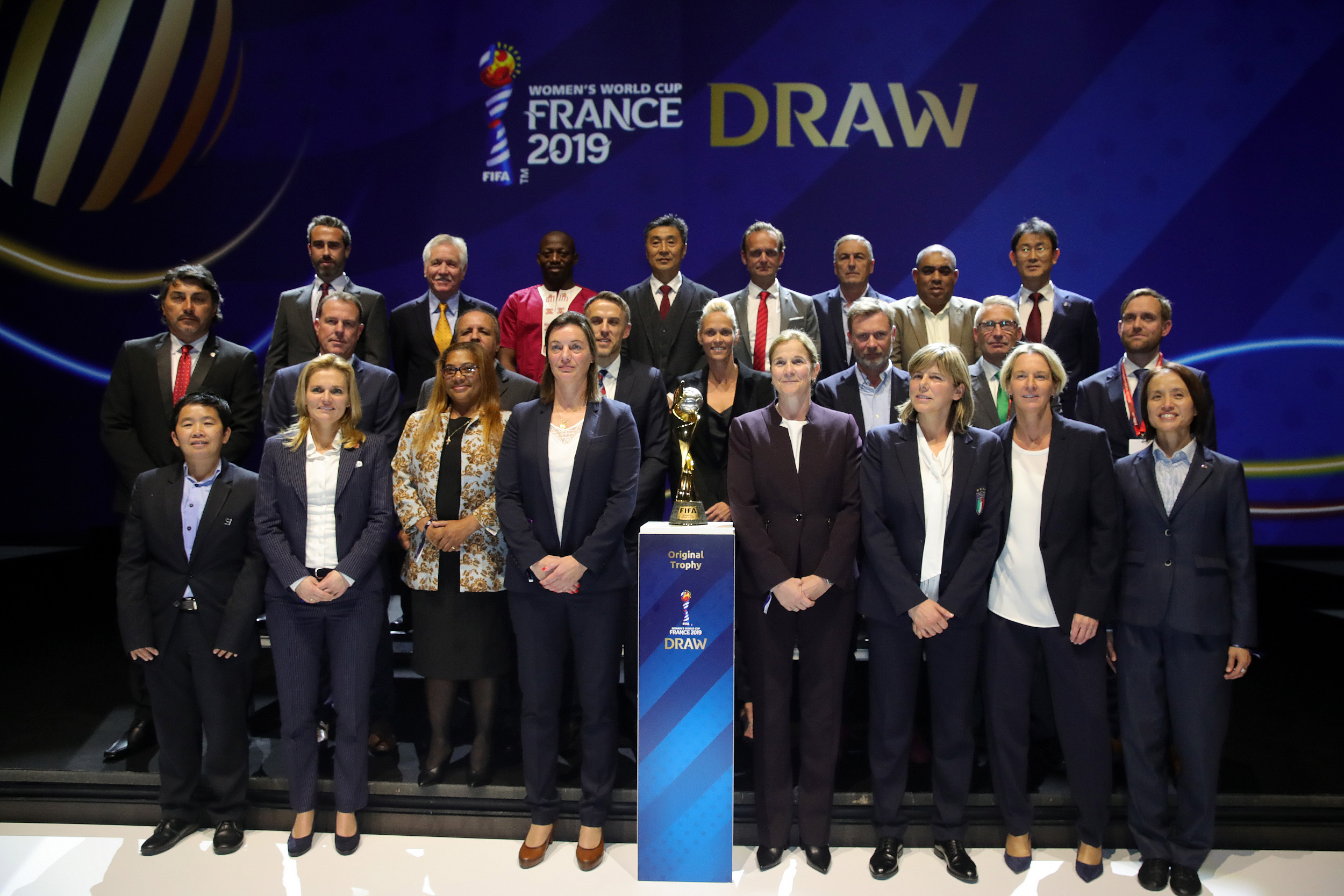
All 24 national coaches are pictured following the FIFA Women's World Cup France 2019 draw in Paris, France, December 8, 2018. /VCG Photo
FIFA has had the same requirement for youth tournaments since 2015, and in October, it kicked off its first FIFA Coach Mentorship Program, aimed at aspiring female coaches.
Already, there are signs that more women are seeing this as a viable career option. From 2015 to 2017, the number of women holding a UEFA Pro license doubled to 127.
The attention enjoyed by this year's World Cup could now tempt recruiters and clubs to look more their way, especially if Corinne Diacre's French team, Ellis's U.S. women or Wiegman's Leeuwinnen make it to the final.
A female coach for a men's team?
Some meanwhile are calling for female coaches to cross over to men's sports, without waiting for a boost in numbers on the women's side.
There have already been high-profile examples of this worldwide, including Diacre, who coached French men's team Clermont Foot from 2014 to 2017.
In Asia, Chan Yuen-ting helped Hong Kong side Eastern SC to their first ever AFC Champions League in 2017.
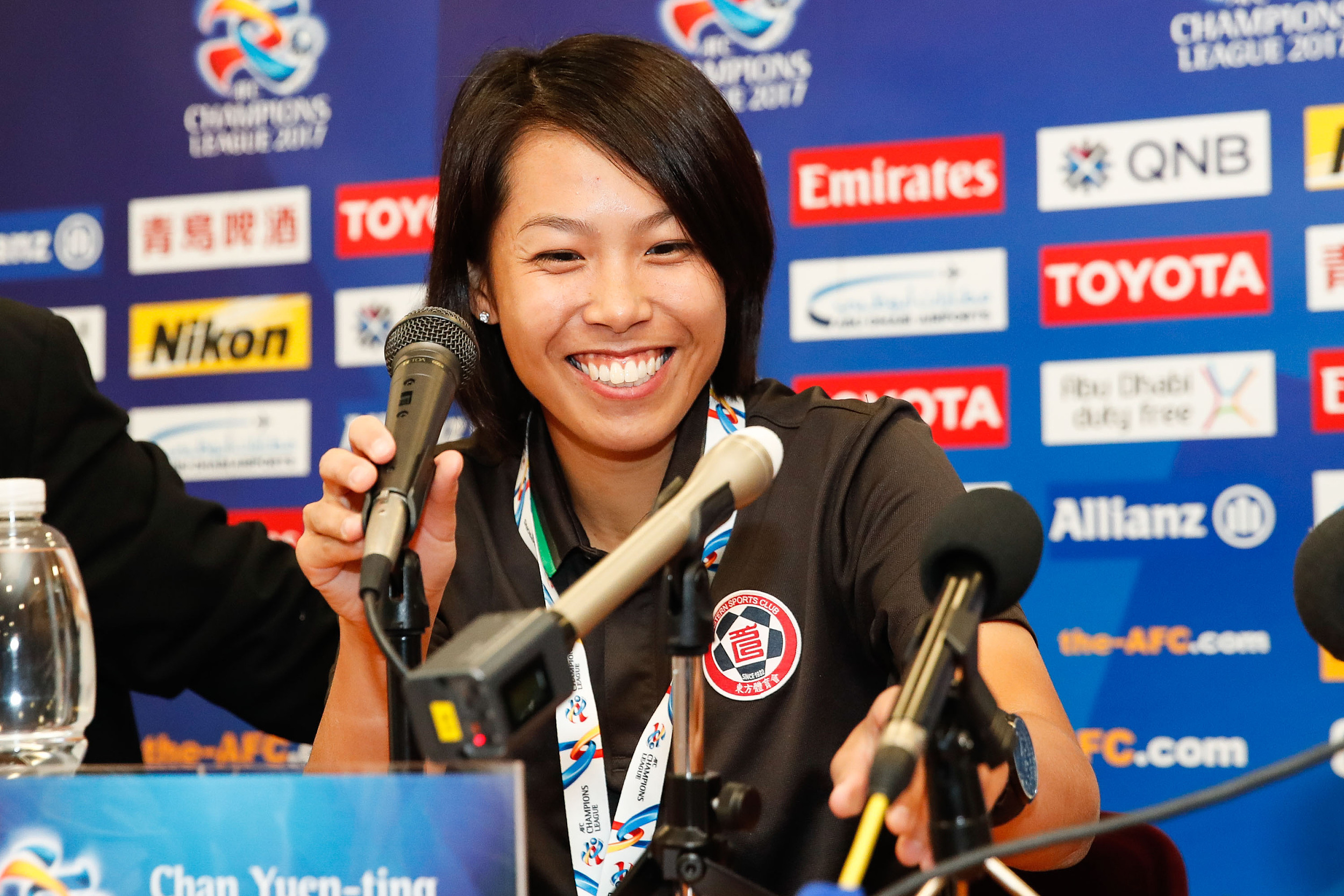
Eastern SC coach Chan Yuen-ting speaks during a 2017 AFC Champions League press conference, April 24, 2017. /VCG Photo
Former Bayern women's coach Sissy Raith and two-time European champion Inka Grings have both managed German regional men's sides.
When female coaches are put in charge of a men's team, it is often in the lower leagues. And the fact that this still makes headlines shows it is highly unusual.
But there is hope they could soon break into the top leagues as well.
"It is a matter of time before there is a female coach in the men’s game,” Chelsea women's manager Emma Hayes, a respected name in English women's football, said recently.
She has already been tipped as a possible replacement for Maurizio Sarri, the manager of the men's side, if he leaves this summer. This would make her the first ever female manager of an English Premier League club.

Copyright © 2018 CGTN. Beijing ICP prepared NO.16065310-3
Copyright © 2018 CGTN. Beijing ICP prepared NO.16065310-3